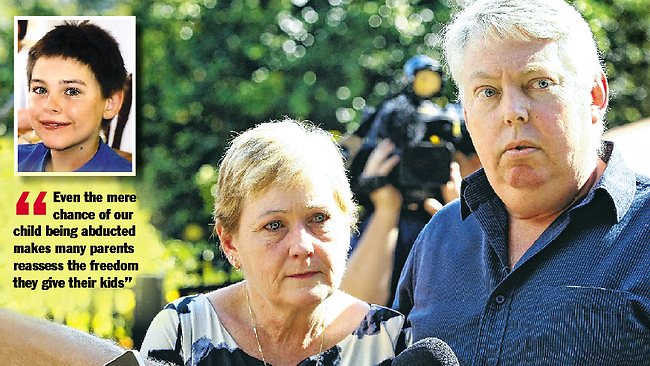 |
|
Bruce and
Denise Morcombe say they have been encouraged by messages of
support
from the public. Source: Herald Sun |
| |
THE abduction and murder of Queensland teenager Daniel Morcombe is a
terrifying reminder of how vulnerable our children are.
Few of us have forgotten the case that baffled police for eight long
years.
At its core was a chilling question: How can a child disappear without a
trace in a public place?
Tragedies like this feed all our innermost fears of faceless predators
waiting around every corner, waiting to pounce on our kids.
As a parent it just makes you never want to let your kids out of your
sight.
But that's not the answer.
Cases like the 2003 tragedy
involving Daniel, the unsolved 2007 disappearance in Portugal of British
child Madeleine McCann, or the 1996 murder of US child beauty
pageant contestant JonBenet Ramsay inflate in our own minds the
potential danger posed by strangers.
.
The bottom line is that we can't let a couple of high-profile child
homicide cases dictate how we raise our kids.
The real issue for many parents is Daniel's age. He wasn't six or seven
at the time of the abduction.
He was 13 years old. He was old enough to look after himself.
He should have been safe.
His parents obviously trusted him to catch the bus alone in broad
daylight in the middle of summer. He had probably made the trip many
times before without incident.
And yet on that day in 2003, he went out to buy Christmas presents for
his family, but did not return.
He had intended to catch the 1.35pm bus to Sunshine Plaza, but in a
cruel twist of fate, the bus he was waiting for had broken down. A
replacement bus picked up some stranded passengers, but to make up time,
the bus did not stop to pick up Daniel. It was to be a deadly oversight.
Police claim a 41-year-old truck driver, a father of three, abducted and
murdered him.
It's unimaginable that a father could do anything like this.
The charge sheet alone provides a chilling account of what Daniel's last
hours might have involved. His accused killer has been charged with
murder, deprivation of liberty, child stealing, indecent treatment of a
child and interfering with a corpse.
But this doesn't change the fact that countless kids both older and
younger than Daniel catch buses alone every day. They walk alone to
school. They play with their friends in the local park. They deliver
newspapers, they buy lollies, or they ride their bikes around the
streets without their parents.
And they return home safely.
It's what we did as kids, and it's the way we want to raise our own
kids, isn't it?
But even the mere chance of our child being abducted makes many parents
reassess the freedom they give their kids.
It's a pertinent issue for me as a parent because my husband and I have
just started allowing my son and his five-year-old sister to walk two
blocks on quiet suburban back streets to the local milk bar by
themselves.
It gives them the independence we want them to have, and the freedom
they crave.
It also shows them that we trust them to cross roads safely, to buy
things with money, and to avoid danger -- whether that's in the form of
a stranger, a vicious dog or a fast car.
But it's a controversial move, with many of our friends saying they're
just too young to be allowed out alone.
I'd argue, however, that kids need to be able to take calculated risks
when they are young so they learn to make good decisions.
We can't wrap them up in cotton wool throughout their childhoods, and
then just turn them loose once they turn 18.
We can't always be there to protect them, but we can teach them to make
good decisions. And the best way for them to develop good instincts is
to let them gradually have more and more freedom, within measured
limits.
The fact is that most child homicides result from physical abuse
inflicted by a male relative. According to a recent Australian study of
165 child homicides, 40 per cent were the result of children being
physically abused by either a father or a stepfather.
Overall, the leading cause of death for children in Australia is road
accidents, accidental drowning, then assault and then homicide.
We may fear the stranger lurking in the bushes ready to snatch our
child, but a scenario like this is not the biggest threat facing our
kids.
And online it's the same.
CALIFORNIAN research published in the journal Psychology of Violence
last year shows that online predators are not generally strangers who
trick or force children into predatory relationships.
Rather, they are more likely to be adults who meet, develop
relationships with, and openly seduce underage teenagers. It's not the
stranger who's the biggest threat, but someone who may have become close
to the child.
At the end of the day, parents just have to go with what feels right.
What one child can manage at the age of seven or eight might only be
right for another aged 10 or 12.
No doubt Daniel's parents spend just about every waking moment wanting
to rewrite history, and change that one fateful December day.
But they weren't responsible for the actions of the sick madman who took
their son. They were just letting Daniel get on with living his life. |


